I recently obtained a Macintosh Classic II at a yard sale for 5 USD. The guy said it worked, so I turned it on and it displayed 4 vertical black and white lines with some random lines and dots near the top. I swapped the RAM with working chips I had in another old Macintosh but the computer still displayed the same exact thing. If someone has the information and can help me, please tell me. Thank you.
Anonymous
User login
Please support the defense of Ukraine.
Direct or via Unclutter App
Active forum topics
Recent content
Navigation
No Ads.
No Trackers.
No Social Media.
All Content Locally Hosted.
Built on Free Software.
We have complied with zero government requests for information.

... this indicates that the Power/Sweep board (which controls video AC power conversion and video signal) has gone bad. It will most likely need to be replaced.
Classic IIs tend to be pretty common and inexpensive. Maybe another 'Fritter might have the part you need.
This might help, I still think it's PSU.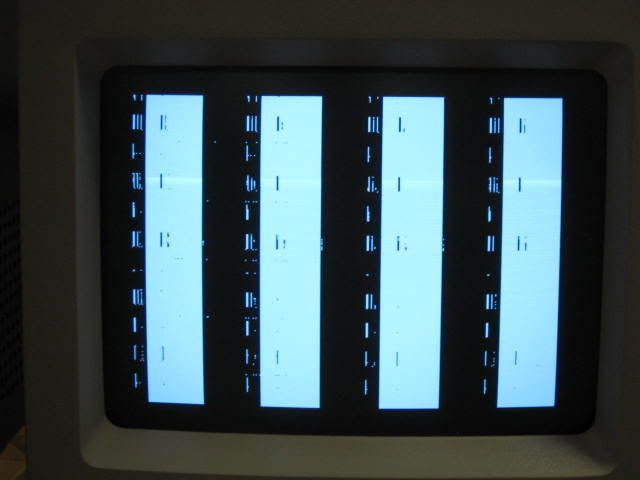
ahh, the double posting thing.
I left the computer on for a while. It then booted up but didn't show the mouse pointer. It then made a little musical tone. Then did nothing. Help if you can
Hey,
Bad RAM, Mrs. Torrance, bad RAM. That sound -- known as the chimes of doom -- indicates mismatched, wrong or fried RAM.
William
www.williamahearn.com
Thank for the info, but explain more of "mismatched".
Hey,
The Classic II uses 100ns 30-pin SIMMs. Some machines are really picky about RAM. So, let's say you had a 4MB 100ns RAM chip and a 4MB 60ns or 80ns installed, the Mac could get confused and spew the chimes of doom. Mismatched RAM works in mysterious ways. Once I had a 6100 that worked fine until I tried to install a new OS and then it went beserk. Matching the RAM is the most logical -- but not neccessarily ultimate -- solution.
William
www.williamahearn.com
You have bad capacitors on the motherboard, you can either whip out your soldering iron or put the motherboard in a dishwasher/ wash it off in a sink. Be sure to let it dry at least 3 days. And the chimes of death could mean a multitude of different things not just bad ram.
I forgot to mention that the machine makes funny sounds. It sounds like it's charging up a laser beam or something, starts out low then goes high pitched, then just keeps squeaking on.
that high pitched sound is also a sign of bad capacitors.
Hey,
You said: "And the chimes of death could mean a multitude of different things not just bad ram."
Really? Please list some of the "multitude[s]" and please include references and links. I would like to see some of the multitudes -- limited to the Classic II or prior. One could guess ROM -- but multitudes? Please enlighten us.
William
www.williamahearn.com
So, if I place the Macintosh Classics' motherboard inside my dishwasher and wash it, that will do what? Besides making it clean.
I had posted this same problem in the AF Kiwi forum last year March. When I went to find that post, suddenly I see that Kiwi doesn't seem to exist anymore. Was it canned? I didn't even notice. My post doesn't show up in my tracking, so I guess all the posts there got nixed with the forum. Anyway, my Classic II pic is still in my gallery here.
Jon was the only one who responded to it, and he said the same thing about cleaning the capacitors. There was some kind of aerosol spray he suggested. I never did bother trying to fix the problem. Both my Classics II which I still own have the problem, but if you leave them on, eventually the boot screen pops up and the machine boots to the OS7 I've got on their harddrives. I've found that if the machines have been in use, it takes less time for the wait, if at all. Leave it off for a day, and it's back to the long wait. That's what capacitors are all about, n'est ce pas?
Washing the motherboard will wash the electrolytic fluid that leaked out of the capacitors. The presence of the fluid, iirc, causes shorts in some of the chips, giving you that screen you get.
I leave the machine running. After a while it goes to the gray screen with the startup bong, after 10 sec it do the death chime. What do I do?
You'll get the chimes of death if the RAM is not seated properly too, or there might be corrosion in the RAM slots. On those old 72pin SIMM slots it's very easy to NOT have the RAM seated properly and not realize it. You really have to make sure you wedge them in snuggly, and keep them in as you push them uniformly over into the clips. So the best thing to do is wash the logic board as instructed by others here, check the RAM slots--you might want to carefully take a toothbrush or other small brush to make sure the slots are clean (I have very strong magnifiers to check such things, as well as well-practiced steady hands and minute sharp tools--but that's not recommended at all for the faint of heart)--and then make sure the RAM is properly well seated in their slots, reinstall the logic board, and see what happens. Report back in a few days when you've tried it. You go first, and then I'll try it.
I once did only 3 hours
you can use isopropyl to clean the spots that are covered with fluid from the caps if you dont want to put it in the dishwasher
Here's some pics.

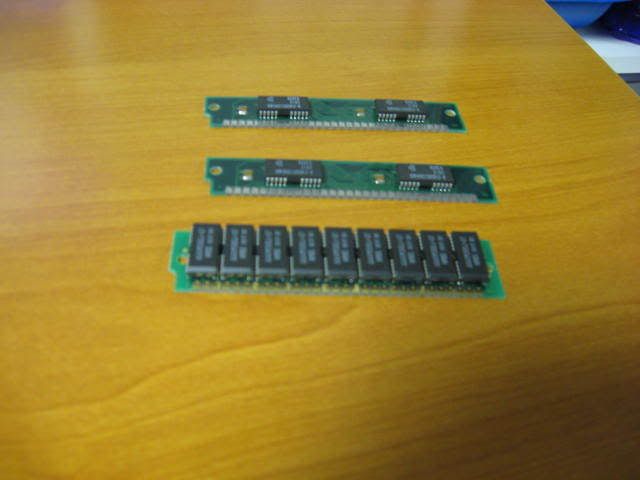

Which chip's should I put in, which order, and how do I know if it is seated correctly?
I went to boot up the machine again. After waiting awhile it was still in the screen with the vertical bars. I waited 1 min., 2 min., 3... Nothing happened. What could be the problem.
Are you using a digital camera? Why don't you put it at high resolution and take a picture of the whole motherboard and post it here. The little bit of the motherboard we can see in your pic looks pretty clean.
My hands were a little shaky at the time, thats why they look fuzzy. I will post some pics of the entire motherboard very soon.
Got the pic's. You can't see it, but two of the pins on the processor are bent a little, they still work.
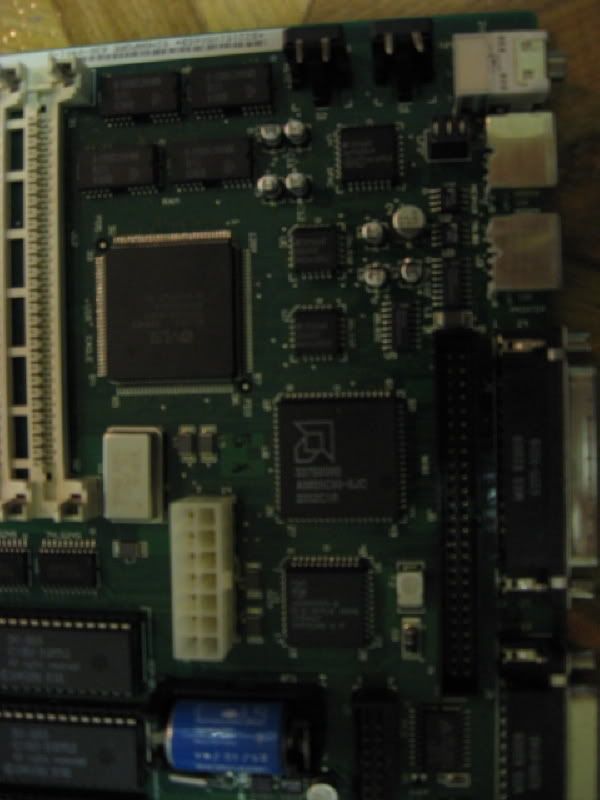
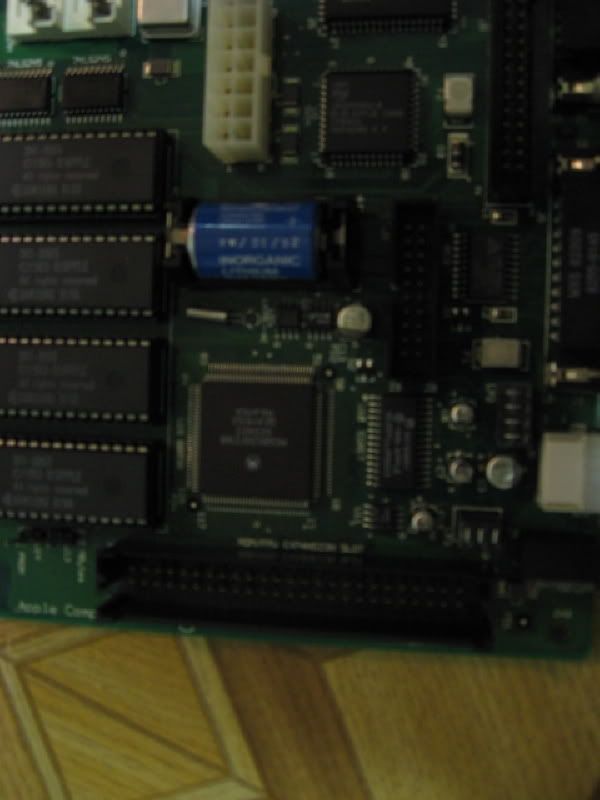
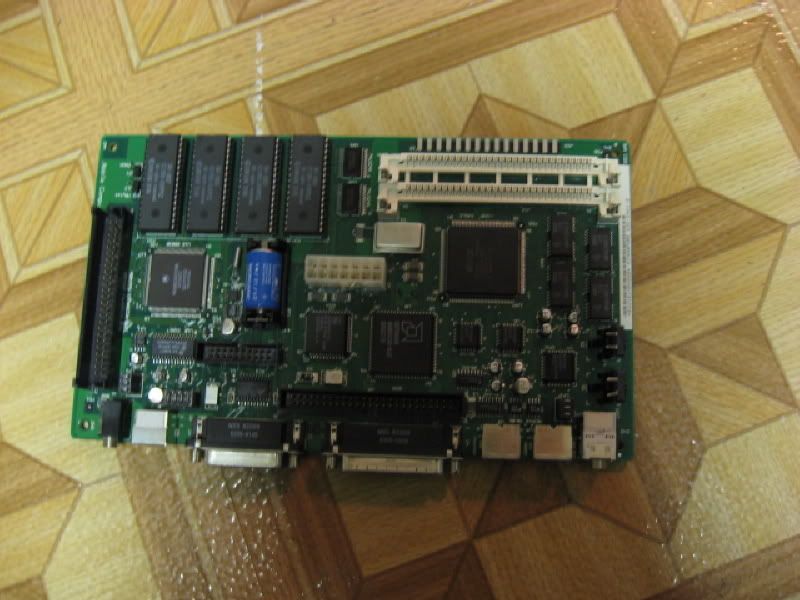
For a compact monochrome AIO such as the Classic II, which also uses system DRAM on the MLB as VRAM, to function in 24- or 32-bit mode with 30-pin 8-bit SIMMs, it needs two identical SIMMs in its RAM slots, and they should be as near as dammit in their electrical properties to the soldered-in DRAM. With this 2MB soldered to the board, the absolute maximum is 10MB. The added pair are each ideally 8-chip cards of 100ns, of 1MB, 2MB or 4MB on both cards. Two-chip and 4-chip cards may be too dense (although others will undoubtedly point out that they used them, they were lucky), and they will work no faster than the on-board DRAM (100ns), no matter how low their speed rating (in ns) may be.
The 2-chip cards shown in your pics may be too dense, thus giving you the video effects that you see. Poor seating of cards and leaking capacitors could give artifacts. Goo from capacitors on the MLB could give anomalous behaviour. As much as can be seen, your MLB does, however, look clean. If your SIMMs have gold contacts, well and good, but clean along and not across the contacts with a firm but not hard pencil eraser. Brush off the eraser dust, and blow out the RAM slots, with canned air. If the SIMM contacts are tinned—the usual case—rub more gently than you can with gold plating.
If you get no joy from spic'n'spanning the SIMMs, look at the video connections at the back of the CRT. If they wiggle, are loose, or have visibly 'cold' solder joints (cracked and shrunken away from the cable cores), therein may lie your problem. Check also the connections to the analogue board. Only if all of this fails should you start on the much more arduous MLB-washing or replacement of the capacitors on the MLB.
de
I cleaned the board with isopropyl alcohol, let it dry then turned it on. I waited 3 min., nothing happened. Before, the system made the bong and went into the gray screen then made death chimes in a short time. But nothing happened this time. It just sat in it's screen. What might be wrong?
Clean around the capacitors, like everyone has been saying. Also try re-seating the ROM chips, not just the ram chips. My Classic II gave me a similar problem about 4 years ago and I left it alon until earlier this summer. When I finally looked at it, sure enough the capacitors looked pretty haggard, so I cleaned around them. I noticed some corrosion on the pins of the ROM chips, so I took those out and cleaned their pins and also the sockets for them. It's still a good idea to clean the SIMMs and make sure they've got a good connection. It's back into working condition now, and I need to find a use for it since it was my first Mac and I still love the thing
I don't necessarilly think the type of RAM matters too much, as long as it's matched. The two 4mb sticks I Have in my machine each only have two little chips on them, and they work fine.
I don't know what I did, but it works!
I have a Macintosh Classic II, two ROM version with vertical lines.
All capacitors were replaced and also the logic board was washed using ultra sound.
The pattern on the screen didn't change and looks the same as the problem caused by the capacitor's leak.
Does someone knows what circuits I have to check to fix this problem?
Thank you.
download.jpg